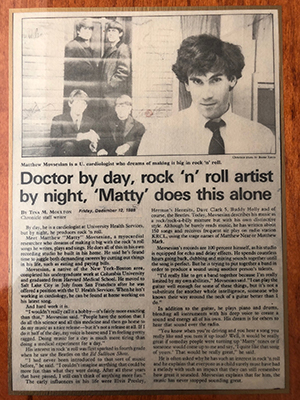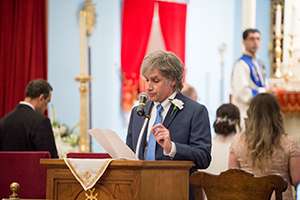Remembering Dr. Matthew Movsesian
It is with a heavy heart that we share the news of Dr. Matthew Movsesian’s passing on Sunday, April 12 after his battle with cancer. Dr. Movsesian, or his preferred moniker, Matty, was a beloved member of our Internal Medicine family.
Born and raised in Forest Hills, Queens in New York City to a loving and supportive family, Mark, Dr. Movsesian’s brother, remembers their parents instilling many of the characteristics in Matty that he was known for in his later years: his intelligence, wit, musical talent, honesty, and above all, the belief to treat others fairly and with dignity.
Dr. Movsesian graduated with honors from Columbia University and later Harvard Medical School. He went on to have a successful career as a research cardiologist, with positions at Northwestern University, the National Institutes of Health, the University of California-San Francisco, and ultimately the University of Utah. For three decades, Dr. Movsesian was a valued faculty member in the Division of Cardiovascular Medicine and at the Salt Lake City VAMC, where he served as Director of Outpatient Cardiology for many years.
“Matty was a caring person with high ethics who was a true delight and privilege to have known,” says colleague, Dr. Miles Housaly of the University of Strathclyde, Glasgow. “He was also a committed and innovative scientist who made significant contributions to the field and whose impact will continue to be felt through the years.” Dr. Movsesian’s research focusedon the role of cyclic nucleotide phosphodiesterases in the treatment of heart failure, and his interest led to the founding of Sirdus – Armenian for “My Heart” – a company to develop heart-failure drugs. Even during his illness, Dr. Movsesian remained focus on his work.

Judy Krall worked with Dr. Movsesian in his research lab at the University of Utah for nearly thirty years. Over these years, Judy recalls their dynamic relationship, filled with humorous “arguments she could never win,” that eventually blossomed into a true friendship. During the late stages of his illness, Judy graciously took him into her home to care for him.
Unable to be with him due to pandemic travel restrictions, Mark was deeply grateful for Judy’s friendship and supportive care. “She showed him love beyond what anyone could expect,” he says, “and at great personal sacrifice, she made Matty’s life as comfortable as it could be, and allowed him to stay in Salt Lake, his home of more than thirty years, where he had so many friends and memories.”
Above all, Dr. Movsesian considered his many friendships to be among the most important things in his world. He was a well-known comedian, an embodiment of age-old saying “laughter is the best medicine” and equipped with an arsenal of “jokes meant for five-year olds, but still made him laugh,” according to Judy. He kept a file of jokes on his laptop, and could never enter or start a meeting without making one.
Dr. Stavros Drakos, a professor in the Division of Cardiovascular Medicine, recalls how Matty infused his comedic talents into his work. “We were on the same plane travelling to a conference and he was showing me the Power Point slides of his presentation requesting feedback,” he remembers, “so I suggested exercising one of his best skills and include a joke or funny cartoon depicting a particular concept. We spent the remainder of the flight thinking of how a cartoon should look like. I will never forget the fun we had during that flight while trying to create such a cartoon.”
“Authentic Matty” as Dr. Drakos describes him, “was very different in terms of personality, but he never tried to hide just how different he was, as if to say, “I’m different and I’m showing you all now. It’s how I am!” He had a strong personality, often with unusual perspectives. I always admired his courage, even when it got him into trouble.”
Dr. Movsesian was also a talented musician. Harvard colleague, Dr. Harold Bursztajn, recalls being his manager when he was a medical student performing at the Nameless Coffee house in Harvard Square. Mark fondly remembers him performing an original song on guitar, “If We Had Only Had the Time,” at his graduation ceremony from Harvard Medical School.
Matty’s love of comedy and music brought many people together, but it was his warmth, compassion, and generous human spirit that brought them even closer.
 “He truly cared for others,” says Dr. Anwar Tandar, an associate professor in the Division of Cardiovascular Medicine. “I still remember the day when I did my first coronary intervention as an attending at the VA for a STEMI in 2007. He gave me a bottle of cognac the next morning to congratulate me, and I still have the cognac to this day. That simple act of care and kindness was louder than anything to me.”
“He truly cared for others,” says Dr. Anwar Tandar, an associate professor in the Division of Cardiovascular Medicine. “I still remember the day when I did my first coronary intervention as an attending at the VA for a STEMI in 2007. He gave me a bottle of cognac the next morning to congratulate me, and I still have the cognac to this day. That simple act of care and kindness was louder than anything to me.”
“He had a huge heart,” agrees Dr. Shannon Odelberg, a research assistant professor in the Division of Cardiovascular Medicine. “He wouldn’t think twice about giving the shirt off his back if anyone was in need. He was extremely appreciative of any small kindness or deed thrown his way.”
On April 20, a small burial service for Dr. Movsesian took place in Salt Lake, with plans to hold an in-person memorial when travel and gathering restrictions are lifted. Mark shared a eulogy, celebrating his brother’s life and his many accomplishments, and has given permission for it to be published. His eulogy can be viewed here.
The Department of Internal Medicine will remember Dr. Movsesian – not only his important work here, but of his authenticity, bravery, and humanity. As we continue into 2020 amidst the uncertainty of the COVID-19 crisis, we look to Dr. Movsesian as a beacon guiding our hearts with kindness and compassion, now more than ever before. He will be dearly missed.